Daniel 1 meaning explained in AI Summary
Setting the Stage: The chapter opens with Nebuchadnezzar, king of Babylon, conquering Jerusalem and taking some of its finest young men captive, including Daniel, Hananiah, Mishael, and Azariah.
Chosen for Service: These four young men, from noble families and known for their intelligence and good looks, are chosen to serve in the king's palace. They are to be educated in Babylonian culture and language, and even provided with food and wine from the king's own table.
A Test of Faith: Daniel, however, resolves not to defile himself with the rich food and wine, which likely violated Jewish dietary laws. He proposes a test: for ten days, he and his friends will eat only vegetables and drink only water. If they appear worse than the other young men, they will submit to the king's wishes.
Favor and Wisdom: After the ten days, Daniel and his friends appear healthier and stronger than those who ate the king's food. Impressed, the official allows them to continue their diet. God grants them knowledge and understanding, particularly in literature and dreams. Daniel is even given the ability to understand visions and dreams of all kinds.
Excelling in Babylon: At the end of their training, all the young men are tested by Nebuchadnezzar. Daniel and his friends demonstrate exceptional wisdom and understanding, surpassing all the others. The king finds them "ten times better" than all the magicians and enchanters in his entire kingdom.
Key Themes:
- Faithfulness in Exile: Despite being in a foreign land, Daniel and his friends remain faithful to God and their beliefs, even when faced with pressure to conform.
- God's Sovereignty: Even in captivity, God is shown to be in control, providing for and honoring those who remain faithful to Him.
- Wisdom and Understanding: God blesses Daniel and his friends with exceptional wisdom and understanding, allowing them to excel in their new environment.
Foreshadowing: This chapter sets the stage for the rest of the book, highlighting Daniel's unwavering faith and God's power, which will be further demonstrated through future trials and triumphs.
Daniel 1 bible study ai commentary
The overarching theme of Daniel 1 is God's absolute sovereignty over world empires and His faithfulness to preserve and elevate those who remain steadfast to Him in the midst of overwhelming cultural and religious pressure. It establishes that even in apparent defeat and exile, God is orchestrating events for His ultimate purpose, empowering His people to witness and thrive not by worldly assimilation but by divine wisdom and provision.
Daniel 1 context
The historical setting is 605 B.C. during the first Babylonian invasion of Judah. This was not the final destruction of Jerusalem (which occurred in 586 B.C.), but the initial wave where Nebuchadnezzar II, the new king of Babylon, asserted his dominance. Babylon was the epicenter of a sophisticated, polytheistic culture centered on gods like Marduk (Bel) and Nabu. Their imperial policy was to assimilate the brightest minds of conquered nations, retraining them to serve the empire. This process involved changing their language, diet, literature, and even their names to erase their former identity and allegiance, making their stand for God a direct confrontation with the state's indoctrination program.
Daniel 1:1-2
In the third year of the reign of Jehoiakim king of Judah, Nebuchadnezzar king of Babylon came to Jerusalem and besieged it. And the Lord gave Jehoiakim king of Judah into his hand, with some of the vessels of the house of God. And he brought them to the land of Shinar, to the house of his god, and placed the vessels in the treasury of his god.
In-depth-analysis
- v. 1 "Third year of... Jehoiakim": This chronological note has caused debate, as Jeremiah 25:1 & 46:2 place the Battle of Carchemish (and this invasion) in Jehoiakim's fourth year. This is resolved by understanding different accession-year vs. non-accession-year dating systems. Babylonians didn't count the king's first partial year of rule as "year one," while Hebrews sometimes did. Daniel is likely using the Babylonian method.
- v. 2 "The Lord gave": The Hebrew verb is nātan. This is the theological key to the entire book. The conquest is not a failure of Yahweh or a victory for Babylonian gods. It is a sovereign act of God's judgment against an unfaithful Judah, executed through Nebuchadnezzar.
- "Land of Shinar": This name intentionally hearkens back to Genesis 11, the location of the Tower of Babel. It identifies Babylon as the archetypal center of human rebellion and pride against God.
- "The house of his god": This was likely the Esagila, the temple of Marduk in Babylon. Placing the holy vessels from Yahweh's temple in Marduk's treasury was a public declaration of the Babylonian god's supposed superiority.
Bible references
- 2 Ki 24:1: "...Nebuchadnezzar king of Babylon came up, and Jehoiakim became his servant for three years." (The historical event)
- 2 Ch 36:6-7: "Against him came up Nebuchadnezzar ... and carried him to Babylon, ... also carried some of the vessels of the house of the LORD." (Parallel historical account)
- Jer 25:9: "...Nebuchadnezzar the king of Babylon, my servant, and I will bring them against this land..." (Prophecy of God using Nebuchadnezzar)
- Ezra 1:7: "Cyrus the king also brought out the vessels of the house of the LORD... and Cyrus ... had them brought out..." (The reversal and restoration of these same vessels)
Cross references
Hab 1:5-6 (God raising up the Chaldeans); Isa 39:6-7 (Isaiah's prophecy to Hezekiah of this event); Gen 11:2 (Connection to Shinar/Babel).
Polemics: This opening is a direct polemic against the "theology of victory." The original audience, living in exile, would wonder if their God was weaker than the gods of Babylon. Daniel's first words assert that this catastrophe was, in fact, an act of their own God's sovereign will, a planned judgment, not a cosmic defeat.
Daniel 1:3-5
Then the king commanded Ashpenaz, his chief eunuch, to bring some of the people of Israel, both of the royal family and of the nobility, youths without blemish, of good appearance and skillful in all wisdom, endowed with knowledge, understanding learning, and competent to stand in the king's palace, and to teach them the literature and language of the Chaldeans. The king assigned them a daily portion of the food that the king ate, and of the wine that he drank. They were to be educated for three years, and at the end of that time they were to stand before the king.
In-depth-analysis
- "Chief eunuch": This was a high-ranking court official. The youths being placed under his care strongly implies they may have been made eunuchs themselves, which would be a direct fulfillment of Isaiah 39:7.
- "Without blemish, of good appearance": These terms echo the qualifications for Levitical priests and perfect sacrificial animals (Lev 21:18; 22:20). Babylon was selecting a new "priesthood" to serve its own kingdom and ideology.
- "Literature and language of the Chaldeans": This was a comprehensive re-education program. They were taught cuneiform script, Akkadian language, and Babylonian literature, which included myths, astrology, divination, and incantations. It was an attempt to fundamentally rewire their worldview.
- "King's food and... wine": This was not just a meal plan; it was a symbol of dependence, favor, and initiation into the Babylonian system. Accepting it meant accepting the king as their ultimate provider.
- "Three years": A period of intense training, similar to how many professional or religious apprenticeships would last. After this period, their transformation was expected to be complete.
Bible references
- Isa 39:7: "'...and some of your own sons... shall be eunuchs in the palace of the king of Babylon.'" (Direct prophecy fulfilled)
- Gen 41:45-46: "And Pharaoh called Joseph's name Zaphenath-paneah. And he gave him... Asenath... Joseph was thirty years old when he stood before Pharaoh..." (Parallels of an Israelite rising to prominence in a foreign court)
Cross references
Act 7:22 (Moses was educated in all the wisdom of the Egyptians); Est 2:9 (Esther receiving special food and attendants).
Daniel 1:6-7
Among these were Daniel, Hananiah, Mishael, and Azariah of the tribe of Judah. And the chief of the eunuchs gave them names: Daniel he called Belteshazzar, Hananiah he called Shadrach, Mishael he called Meshach, and Azariah he called Abednego.
In-depth-analysis
- The Hebrew Names: Each name was theophoric, containing a name for God (
ElorYah/Jah):- Daniel: God (
El) is my Judge. - Hananiah: The LORD (
Yah) is Gracious. - Mishael: Who is what God (
El) is? - Azariah: The LORD (
Yah) has Helped.
- Daniel: God (
- The Babylonian Names: The new names were an attempt to force a new identity by invoking Babylonian gods.
- Belteshazzar: Likely "Bel (Marduk) protect his life."
- Shadrach: Possibly "Command of Aku" (the moon god).
- Meshach: A play on Mishael, "Who is what Aku is?"
- Abednego: Servant of Nego (a variant of Nabu, the god of wisdom).
Bible references
- Gen 41:45: "And Pharaoh called Joseph's name Zaphenath-paneah." (Parallel of name-changing as assimilation)
- 2 Ki 24:17: "And the king of Babylon made Mattaniah, Jehoiachin's uncle, king in his place, and changed his name to Zedekiah." (Common practice to assert authority)
- Rev 2:17: "To the one who conquers... I will give him a white stone, with a new name written on the stone that no one knows except the one who receives it." (God's final, victorious re-naming of his faithful).
Polemics: This renaming is the heart of the cultural battle. The narrative, however, defiantly continues to use their Hebrew names (except when quoting Babylonians), signaling that the attempted brainwashing did not succeed. Their true identity remained tied to the God of Israel.
Daniel 1:8
But Daniel purposed in his heart that he would not defile himself with the king's food, or with the wine that he drank. Therefore he asked the chief of the eunuchs to allow him not to defile himself.
In-depth-analysis
- "Purposed in his heart": Hebrew yasem ‘al-libbo, literally "placed upon his heart." This signifies a firm, settled, and deliberate resolve. This is the pivotal act of the chapter—a conscious decision of faithfulness.
- "Not defile himself": The defilement (
pāṯbaḡ) could stem from multiple issues:- The food included animals considered unclean by Levitical law (Lev 11).
- The animals were likely not slaughtered according to Jewish law (i.e., not drained of blood, see Lev 17:10-14).
- Most significantly, the food and wine were almost certainly first offered as a sacrifice to Babylonian idols, making participation an act of pagan worship.
Bible references
- Pro 4:23: "Keep your heart with all vigilance, for from it flow the springs of life." (The principle of guarding one's heart/will)
- Rom 12:2: "Do not be conformed to this world, but be transformed by the renewal of your mind..." (The NT principle of resisting worldly conformity)
- 1 Cor 8:4-8: "...an idol has no real existence... But food will not commend us to God." (Paul discusses the issue of food sacrificed to idols for the NT church).
Cross references
Psa 119:9-11 (Keeping pure by the Word); Eze 4:13-14 (Ezekiel's distress over eating defiled bread in exile); Act 10:14 (Peter's resistance to eating what is unclean).
Daniel 1:9-16
And God gave Daniel favor and compassion in the sight of the chief of the eunuchs... [who expressed fear for his life]... So Daniel said to the steward whom the chief of the eunuchs had assigned over Daniel... "Test your servants for ten days; let us be given vegetables to eat and water to drink..." At the end of ten days it was seen that they were better in appearance and fatter in flesh than all the youths who ate the king's food. So the steward took away their food and the wine they were to drink, and gave them vegetables.
In-depth-analysis
- v. 9 "God gave Daniel favor": The word is hesed (lovingkindness, covenant loyalty) and rahamim (mercy). Again, God is the active agent, moving the heart of a pagan official.
- v. 12 "Vegetables": The Hebrew is zērōʻîm, literally "things sown" or "seeds." This likely refers to a simple diet of grains, legumes, fruits, and vegetables—a diet rooted in God's provision at creation (Gen 1:29).
- "Ten days": A period of testing, biblically used to denote a limited but complete duration (Gen 24:55; Rev 2:10).
- v. 15 "Better in appearance and fatter in flesh": This result is supernatural. A simple vegetable diet would not normally produce superior results to the king's rich, fattening food in just 10 days. It is a visible sign of God's blessing, proving that His provision is superior to the king's.
Bible references
- Gen 39:21: "But the LORD was with Joseph and showed him steadfast love and gave him favor in the sight of the keeper of the prison." (God granting favor in a parallel situation)
- Pro 16:7: "When a man's ways please the LORD, he makes even his enemies to be at peace with him." (The principle of God intervening in relationships)
- Deu 8:3: "...man does not live by bread alone, but man lives by every word that comes from the mouth of the LORD." (The principle that God's blessing, not just the food itself, gives life)
Cross references
1 Ki 17:15-16 (The widow of Zarephath's miraculous provision); Pro 15:17 (Better a dish of vegetables with love).
Daniel 1:17-20
As for these four youths, God gave them knowledge and skill in all literature and wisdom, and Daniel had understanding in all visions and dreams. At the end of the time, when the king had commanded that they should be brought in... the king spoke with them, and among all of them none was found like Daniel, Hananiah, Mishael, and Azariah... And in every matter of wisdom and understanding about which the king inquired of them, he found them ten times better than all the magicians and enchanters that were in all his kingdom.
In-depth-analysis
- v. 17 "God gave them knowledge": After proving faithful in the "small" matter of diet, God grants them extraordinary gifts in the "large" matter of wisdom. Their skill was not just a product of their intellect but a divine endowment.
- "Daniel had understanding in all visions and dreams": This specific gift sets Daniel apart, much like Joseph in Genesis. It is the crucial skill that will bring him directly before Nebuchadnezzar in chapter 2.
- v. 20 "Ten times better": A figurative expression for overwhelming, comprehensive superiority. They didn't just pass the test; they shattered the curve.
- "Magicians and enchanters": These (
hartummimand’aššāpim) were the professional occult experts of the Babylonian court, masters of divination, astrology, and magical arts. Daniel's wisdom is of a different, and vastly superior, order.
Bible references
- Pro 2:6: "For the LORD gives wisdom; from his mouth come knowledge and understanding." (The source of all true wisdom)
- 1 Cor 1:20, 27: "Where is the one who is wise? ... Has not God made foolish the wisdom of the world? ... God chose what is foolish in the world to shame the wise..." (God's wisdom surpassing worldly wisdom)
- Jam 1:5: "If any of you lacks wisdom, let him ask God, who gives generously to all without reproach, and it will be given him." (The promise of receiving divine wisdom through faith)
Cross references
Gen 41:38-39 (Pharaoh recognizing God's spirit in Joseph); 1 Ki 4:29-30 (Solomon's God-given wisdom); Exo 7:11-12 (Moses' power outshining the Egyptian magicians).
Polemics: This is a powerful demonstration that faithfulness to Yahweh results in wisdom that utterly eclipses the celebrated occultic wisdom of Babylon. It validates God and His servants in the very arena where Babylon claimed expertise.
Daniel 1:21
And Daniel was there until the first year of King Cyrus.
In-depth-analysis
- This single verse spans nearly 70 years, from the start of the exile in 605 B.C. to the decree of Cyrus allowing the Jews to return in 539/538 B.C.
- It serves as a powerful concluding statement of God's sustaining faithfulness. Daniel not only survived but thrived and remained a significant figure through the entire Babylonian empire's reign and into the start of the Persian empire.
- He saw the beginning and the end of the judgment of exile. He was a living testimony to God's promise to preserve a remnant and ultimately bring them home.
Bible references
- Ezra 1:1-2: "In the first year of Cyrus king of Persia... the LORD stirred up the spirit of Cyrus... 'The LORD... has charged me to build him a house at Jerusalem...'" (The historic event Daniel lived to see)
- Isa 44:28: "...who says of Cyrus, ‘He is my shepherd, and he shall fulfill all my purpose’; saying of Jerusalem, ‘She shall be built...’” (The prophecy of Cyrus made 150 years earlier)
- 2 Tim 4:18: "The Lord will rescue me from every evil deed and bring me safely into his heavenly kingdom." (The principle of God's lifelong preservation of His own)
Daniel Chapter 1 analysis
- The Gospel in the Hebrew Names: The four Hebrew names together form a cohesive statement of faith, like a creed:
- Daniel (God is my Judge)
- Hananiah (The LORD is Gracious)
- Mishael (Who is like God?)
- Azariah (The LORD helps)
- Combined theological message: God is our Judge, but the Lord is gracious! Who is like our God? The Lord is our help! This encapsulates the youths' worldview.
- Model for Living in a Pluralistic World: The chapter provides a template for believers living as "exiles" in a culture that is not their own (1 Pe 1:1, 2:11). It advocates for respectful engagement (Daniel's polite request) and intelligent proposal (the 10-day test) rather than angry rebellion or quiet compromise. Faithfulness is demonstrated through creative, courageous, and wise choices.
- The Ascending Scale of Tests: The test in Chapter 1 over diet is a "private" test of personal purity. It prepares them for the "public," life-and-death tests to come in Chapter 3 (the fiery furnace) and Chapter 6 (the lions' den). Faithfulness in small things prepares one for faithfulness in great things.
Daniel 1 summary
In 605 B.C., God allows Nebuchadnezzar to take Judah's finest youths, including Daniel and his three friends, to Babylon for cultural indoctrination. They are given new names to honor Babylonian gods and assigned the king's rich food. Resolving not to defile himself by participating in this pagan system, Daniel proposes a 10-day test on a simple diet of vegetables and water. God blesses their faithfulness, causing them to appear healthier than the others. God then endows them with divine wisdom, making them "ten times better" than all of Babylon's experts, demonstrating the superiority of God's wisdom and His faithfulness to those who honor Him in a hostile environment. Daniel's career miraculously lasts until the end of the exile.
Daniel 1 AI Image Audio and Video


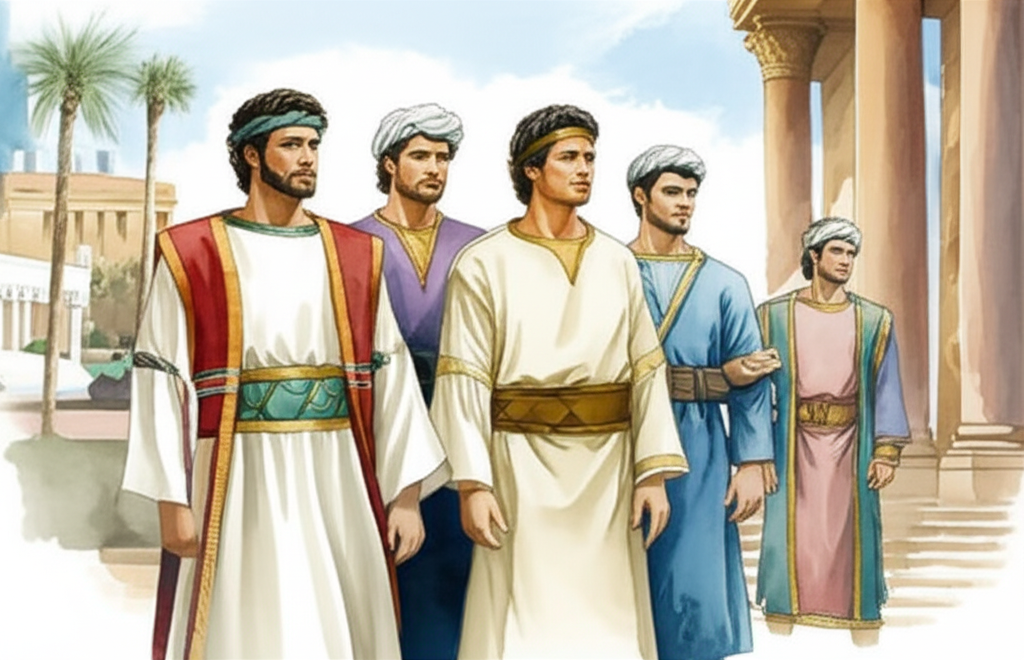
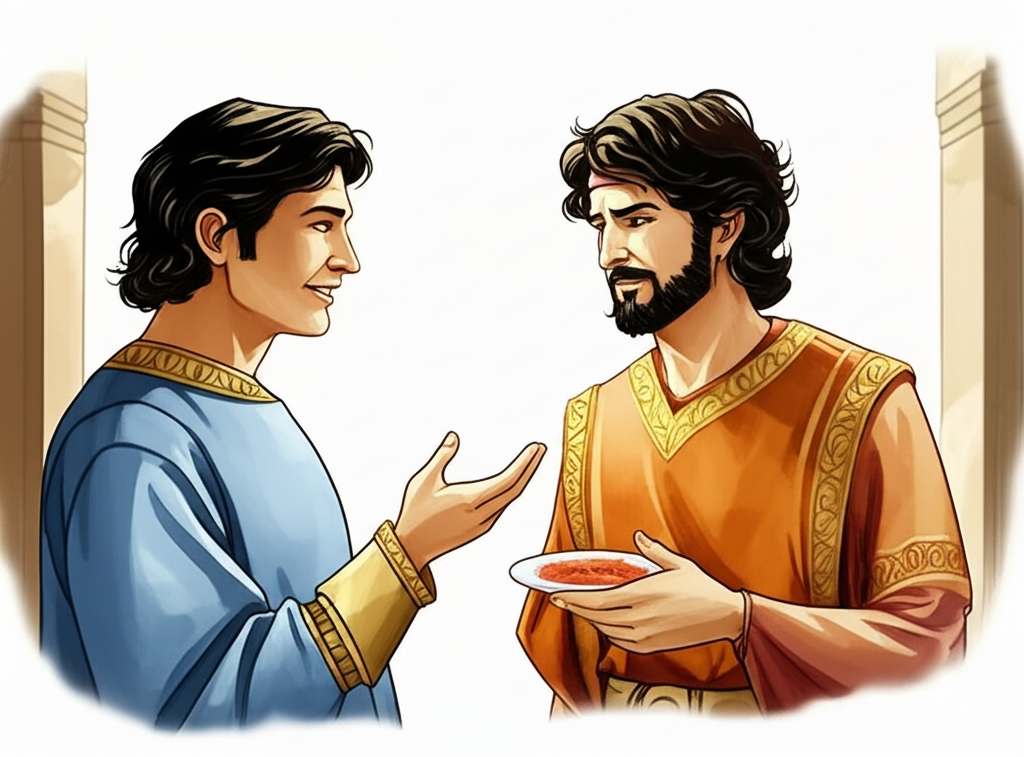
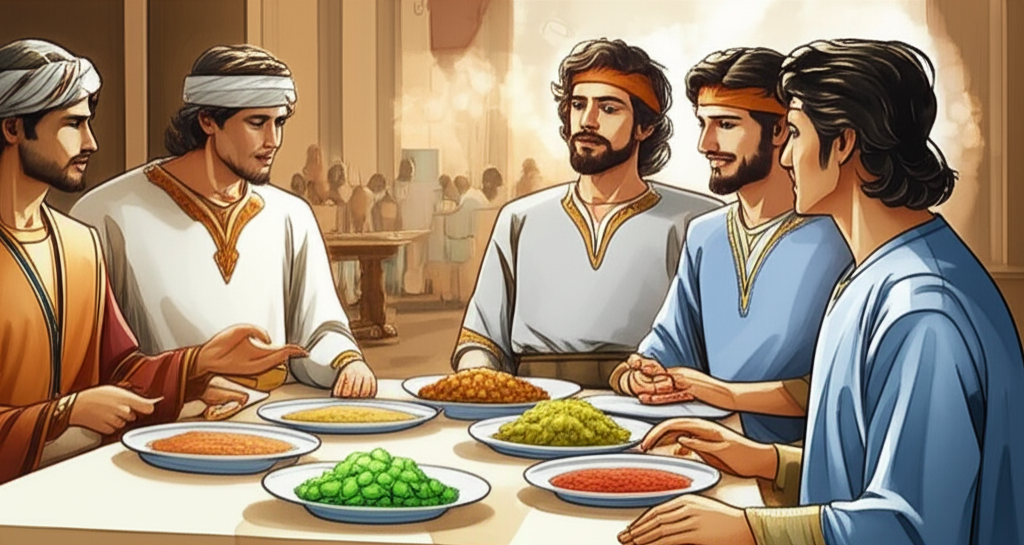
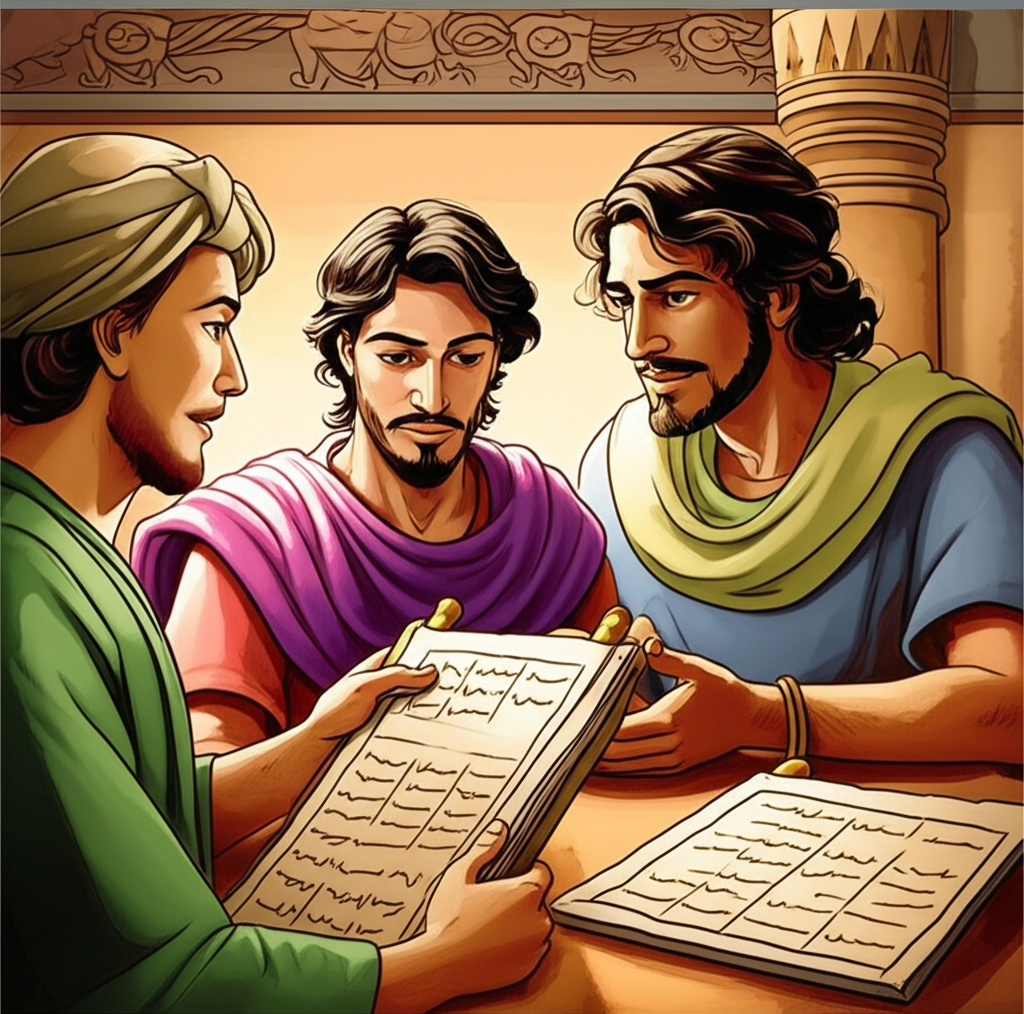
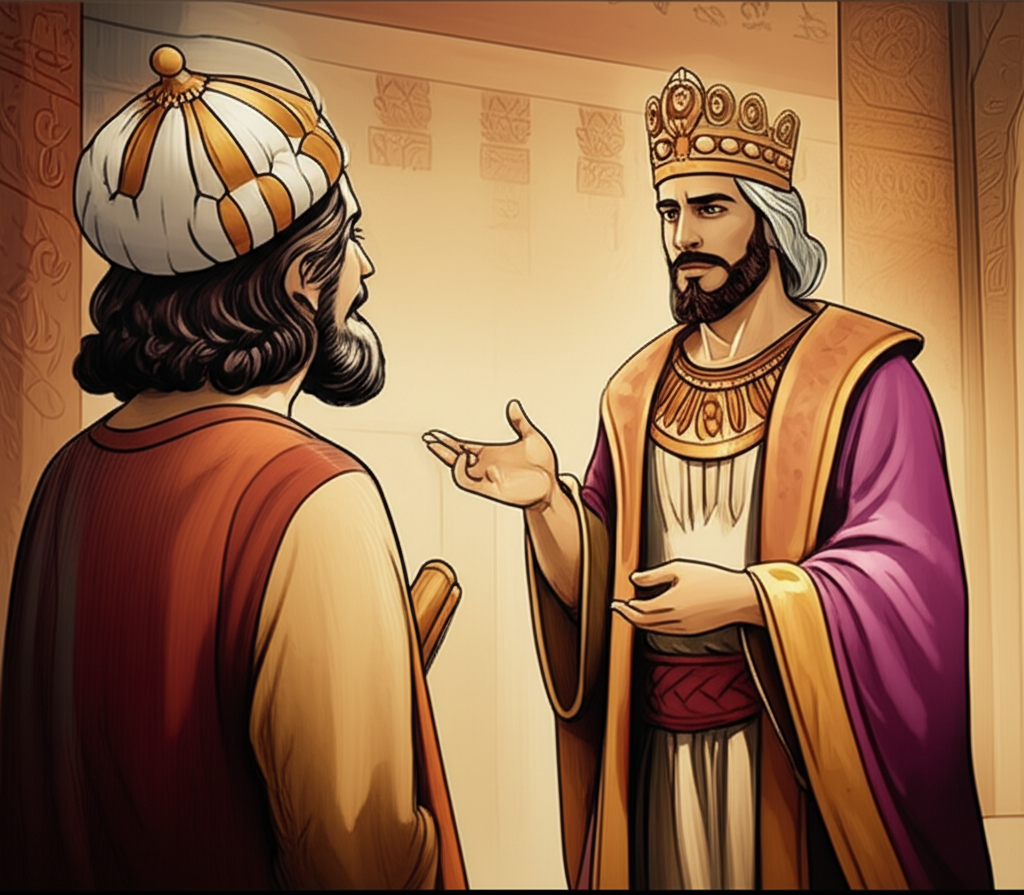
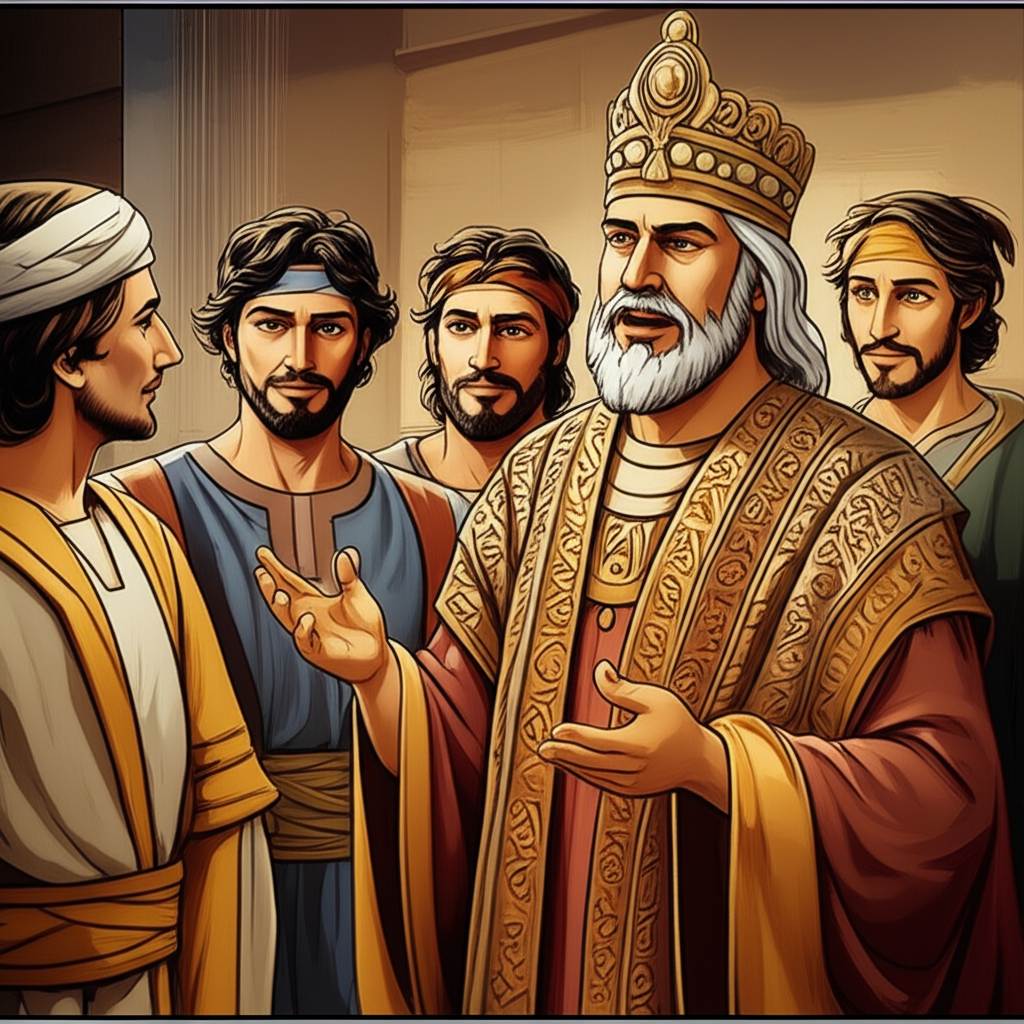
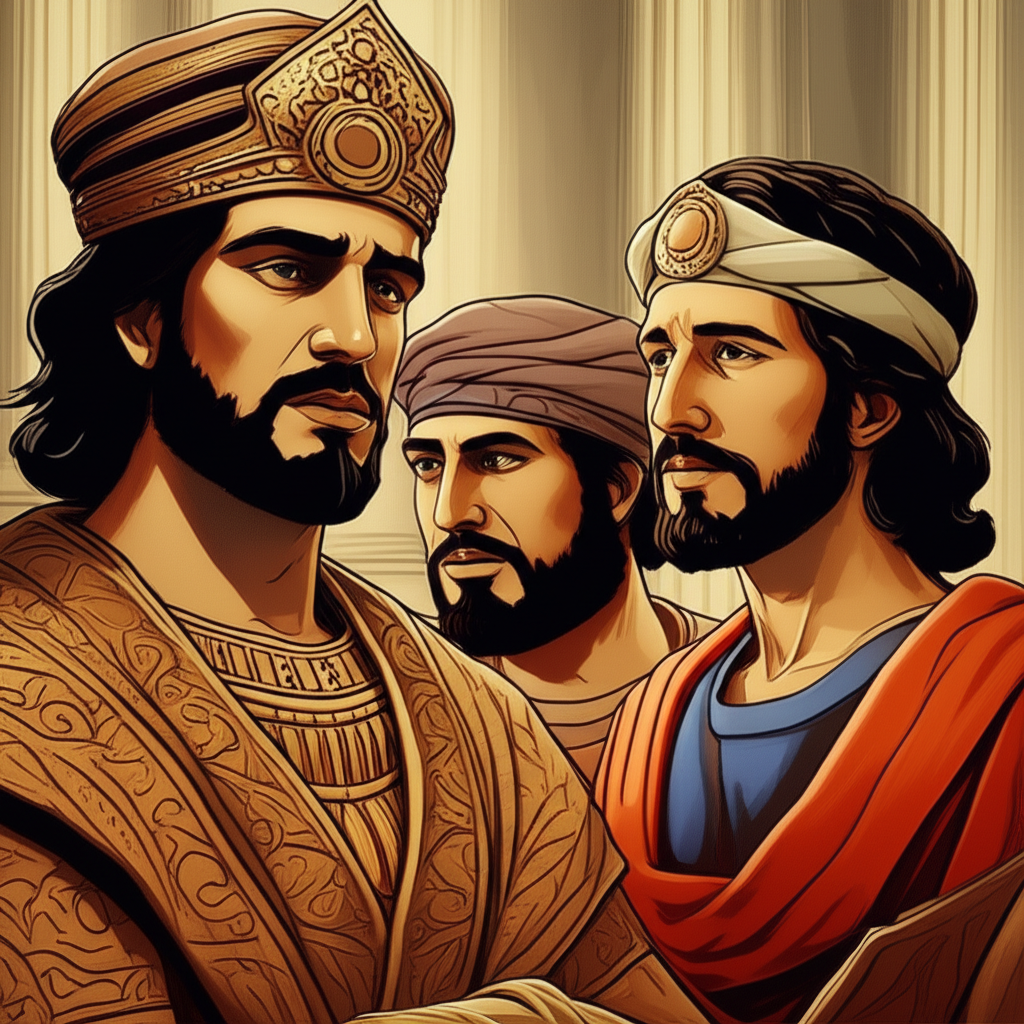
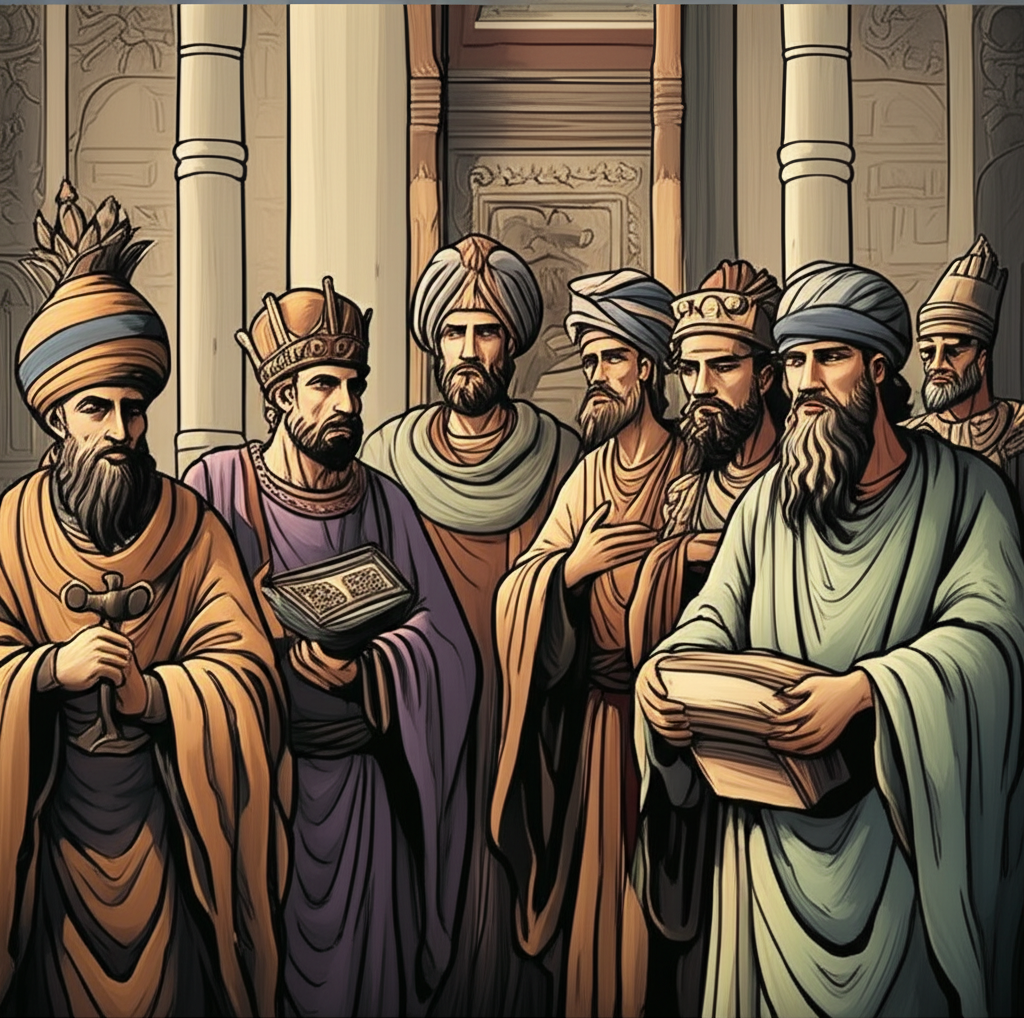
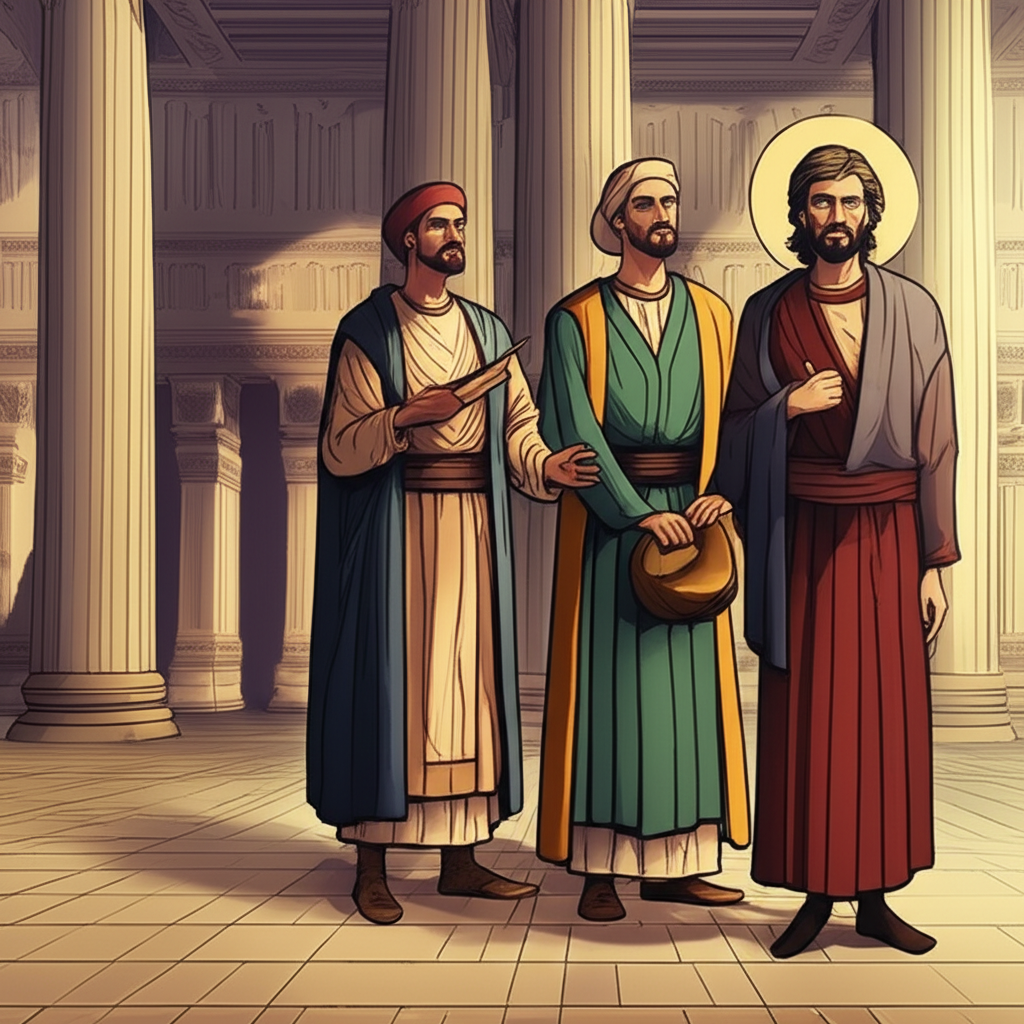
Daniel chapter 1 kjv
- 1 In the third year of the reign of Jehoiakim king of Judah came Nebuchadnezzar king of Babylon unto Jerusalem, and besieged it.
- 2 And the Lord gave Jehoiakim king of Judah into his hand, with part of the vessels of the house of God: which he carried into the land of Shinar to the house of his god; and he brought the vessels into the treasure house of his god.
- 3 And the king spake unto Ashpenaz the master of his eunuchs, that he should bring certain of the children of Israel, and of the king's seed, and of the princes;
- 4 Children in whom was no blemish, but well favoured, and skilful in all wisdom, and cunning in knowledge, and understanding science, and such as had ability in them to stand in the king's palace, and whom they might teach the learning and the tongue of the Chaldeans.
- 5 And the king appointed them a daily provision of the king's meat, and of the wine which he drank: so nourishing them three years, that at the end thereof they might stand before the king.
- 6 Now among these were of the children of Judah, Daniel, Hananiah, Mishael, and Azariah:
- 7 Unto whom the prince of the eunuchs gave names: for he gave unto Daniel the name of Belteshazzar; and to Hananiah, of Shadrach; and to Mishael, of Meshach; and to Azariah, of Abednego.
- 8 But Daniel purposed in his heart that he would not defile himself with the portion of the king's meat, nor with the wine which he drank: therefore he requested of the prince of the eunuchs that he might not defile himself.
- 9 Now God had brought Daniel into favour and tender love with the prince of the eunuchs.
- 10 And the prince of the eunuchs said unto Daniel, I fear my lord the king, who hath appointed your meat and your drink: for why should he see your faces worse liking than the children which are of your sort? then shall ye make me endanger my head to the king.
- 11 Then said Daniel to Melzar, whom the prince of the eunuchs had set over Daniel, Hananiah, Mishael, and Azariah,
- 12 Prove thy servants, I beseech thee, ten days; and let them give us pulse to eat, and water to drink.
- 13 Then let our countenances be looked upon before thee, and the countenance of the children that eat of the portion of the king's meat: and as thou seest, deal with thy servants.
- 14 So he consented to them in this matter, and proved them ten days.
- 15 And at the end of ten days their countenances appeared fairer and fatter in flesh than all the children which did eat the portion of the king's meat.
- 16 Thus Melzar took away the portion of their meat, and the wine that they should drink; and gave them pulse.
- 17 As for these four children, God gave them knowledge and skill in all learning and wisdom: and Daniel had understanding in all visions and dreams.
- 18 Now at the end of the days that the king had said he should bring them in, then the prince of the eunuchs brought them in before Nebuchadnezzar.
- 19 And the king communed with them; and among them all was found none like Daniel, Hananiah, Mishael, and Azariah: therefore stood they before the king.
- 20 And in all matters of wisdom and understanding, that the king enquired of them, he found them ten times better than all the magicians and astrologers that were in all his realm.
- 21 And Daniel continued even unto the first year of king Cyrus.
Daniel chapter 1 nkjv
- 1 In the third year of the reign of Jehoiakim king of Judah, Nebuchadnezzar king of Babylon came to Jerusalem and besieged it.
- 2 And the Lord gave Jehoiakim king of Judah into his hand, with some of the articles of the house of God, which he carried into the land of Shinar to the house of his god; and he brought the articles into the treasure house of his god.
- 3 Then the king instructed Ashpenaz, the master of his eunuchs, to bring some of the children of Israel and some of the king's descendants and some of the nobles,
- 4 young men in whom there was no blemish, but good-looking, gifted in all wisdom, possessing knowledge and quick to understand, who had ability to serve in the king's palace, and whom they might teach the language and literature of the Chaldeans.
- 5 And the king appointed for them a daily provision of the king's delicacies and of the wine which he drank, and three years of training for them, so that at the end of that time they might serve before the king.
- 6 Now from among those of the sons of Judah were Daniel, Hananiah, Mishael, and Azariah.
- 7 To them the chief of the eunuchs gave names: he gave Daniel the name Belteshazzar; to Hananiah, Shadrach; to Mishael, Meshach; and to Azariah, Abed-Nego.
- 8 But Daniel purposed in his heart that he would not defile himself with the portion of the king's delicacies, nor with the wine which he drank; therefore he requested of the chief of the eunuchs that he might not defile himself.
- 9 Now God had brought Daniel into the favor and goodwill of the chief of the eunuchs.
- 10 And the chief of the eunuchs said to Daniel, "I fear my lord the king, who has appointed your food and drink. For why should he see your faces looking worse than the young men who are your age? Then you would endanger my head before the king."
- 11 So Daniel said to the steward whom the chief of the eunuchs had set over Daniel, Hananiah, Mishael, and Azariah,
- 12 "Please test your servants for ten days, and let them give us vegetables to eat and water to drink.
- 13 Then let our appearance be examined before you, and the appearance of the young men who eat the portion of the king's delicacies; and as you see fit, so deal with your servants."
- 14 So he consented with them in this matter, and tested them ten days.
- 15 And at the end of ten days their features appeared better and fatter in flesh than all the young men who ate the portion of the king's delicacies.
- 16 Thus the steward took away their portion of delicacies and the wine that they were to drink, and gave them vegetables.
- 17 As for these four young men, God gave them knowledge and skill in all literature and wisdom; and Daniel had understanding in all visions and dreams.
- 18 Now at the end of the days, when the king had said that they should be brought in, the chief of the eunuchs brought them in before Nebuchadnezzar.
- 19 Then the king interviewed them, and among them all none was found like Daniel, Hananiah, Mishael, and Azariah; therefore they served before the king.
- 20 And in all matters of wisdom and understanding about which the king examined them, he found them ten times better than all the magicians and astrologers who were in all his realm.
- 21 Thus Daniel continued until the first year of King Cyrus.
Daniel chapter 1 niv
- 1 In the third year of the reign of Jehoiakim king of Judah, Nebuchadnezzar king of Babylon came to Jerusalem and besieged it.
- 2 And the Lord delivered Jehoiakim king of Judah into his hand, along with some of the articles from the temple of God. These he carried off to the temple of his god in Babylonia and put in the treasure house of his god.
- 3 Then the king ordered Ashpenaz, chief of his court officials, to bring into the king's service some of the Israelites from the royal family and the nobility?
- 4 young men without any physical defect, handsome, showing aptitude for every kind of learning, well informed, quick to understand, and qualified to serve in the king's palace. He was to teach them the language and literature of the Babylonians.
- 5 The king assigned them a daily amount of food and wine from the king's table. They were to be trained for three years, and after that they were to enter the king's service.
- 6 Among those who were chosen were some from Judah: Daniel, Hananiah, Mishael and Azariah.
- 7 The chief official gave them new names: to Daniel, the name Belteshazzar; to Hananiah, Shadrach; to Mishael, Meshach; and to Azariah, Abednego.
- 8 But Daniel resolved not to defile himself with the royal food and wine, and he asked the chief official for permission not to defile himself this way.
- 9 Now God had caused the official to show favor and compassion to Daniel,
- 10 but the official told Daniel, "I am afraid of my lord the king, who has assigned your food and drink. Why should he see you looking worse than the other young men your age? The king would then have my head because of you."
- 11 Daniel then said to the guard whom the chief official had appointed over Daniel, Hananiah, Mishael and Azariah,
- 12 "Please test your servants for ten days: Give us nothing but vegetables to eat and water to drink.
- 13 Then compare our appearance with that of the young men who eat the royal food, and treat your servants in accordance with what you see."
- 14 So he agreed to this and tested them for ten days.
- 15 At the end of the ten days they looked healthier and better nourished than any of the young men who ate the royal food.
- 16 So the guard took away their choice food and the wine they were to drink and gave them vegetables instead.
- 17 To these four young men God gave knowledge and understanding of all kinds of literature and learning. And Daniel could understand visions and dreams of all kinds.
- 18 At the end of the time set by the king to bring them into his service, the chief official presented them to Nebuchadnezzar.
- 19 The king talked with them, and he found none equal to Daniel, Hananiah, Mishael and Azariah; so they entered the king's service.
- 20 In every matter of wisdom and understanding about which the king questioned them, he found them ten times better than all the magicians and enchanters in his whole kingdom.
- 21 And Daniel remained there until the first year of King Cyrus.
Daniel chapter 1 esv
- 1 In the third year of the reign of Jehoiakim king of Judah, Nebuchadnezzar king of Babylon came to Jerusalem and besieged it.
- 2 And the Lord gave Jehoiakim king of Judah into his hand, with some of the vessels of the house of God. And he brought them to the land of Shinar, to the house of his god, and placed the vessels in the treasury of his god.
- 3 Then the king commanded Ashpenaz, his chief eunuch, to bring some of the people of Israel, both of the royal family and of the nobility,
- 4 youths without blemish, of good appearance and skillful in all wisdom, endowed with knowledge, understanding learning, and competent to stand in the king's palace, and to teach them the literature and language of the Chaldeans.
- 5 The king assigned them a daily portion of the food that the king ate, and of the wine that he drank. They were to be educated for three years, and at the end of that time they were to stand before the king.
- 6 Among these were Daniel, Hananiah, Mishael, and Azariah of the tribe of Judah.
- 7 And the chief of the eunuchs gave them names: Daniel he called Belteshazzar, Hananiah he called Shadrach, Mishael he called Meshach, and Azariah he called Abednego.
- 8 But Daniel resolved that he would not defile himself with the king's food, or with the wine that he drank. Therefore he asked the chief of the eunuchs to allow him not to defile himself.
- 9 And God gave Daniel favor and compassion in the sight of the chief of the eunuchs,
- 10 and the chief of the eunuchs said to Daniel, "I fear my lord the king, who assigned your food and your drink; for why should he see that you were in worse condition than the youths who are of your own age? So you would endanger my head with the king."
- 11 Then Daniel said to the steward whom the chief of the eunuchs had assigned over Daniel, Hananiah, Mishael, and Azariah,
- 12 "Test your servants for ten days; let us be given vegetables to eat and water to drink.
- 13 Then let our appearance and the appearance of the youths who eat the king's food be observed by you, and deal with your servants according to what you see."
- 14 So he listened to them in this matter, and tested them for ten days.
- 15 At the end of ten days it was seen that they were better in appearance and fatter in flesh than all the youths who ate the king's food.
- 16 So the steward took away their food and the wine they were to drink, and gave them vegetables.
- 17 As for these four youths, God gave them learning and skill in all literature and wisdom, and Daniel had understanding in all visions and dreams.
- 18 At the end of the time, when the king had commanded that they should be brought in, the chief of the eunuchs brought them in before Nebuchadnezzar.
- 19 And the king spoke with them, and among all of them none was found like Daniel, Hananiah, Mishael, and Azariah. Therefore they stood before the king.
- 20 And in every matter of wisdom and understanding about which the king inquired of them, he found them ten times better than all the magicians and enchanters that were in all his kingdom.
- 21 And Daniel was there until the first year of King Cyrus.
Daniel chapter 1 nlt
- 1 During the third year of King Jehoiakim's reign in Judah, King Nebuchadnezzar of Babylon came to Jerusalem and besieged it.
- 2 The Lord gave him victory over King Jehoiakim of Judah and permitted him to take some of the sacred objects from the Temple of God. So Nebuchadnezzar took them back to the land of Babylonia and placed them in the treasure-house of his god.
- 3 Then the king ordered Ashpenaz, his chief of staff, to bring to the palace some of the young men of Judah's royal family and other noble families, who had been brought to Babylon as captives.
- 4 "Select only strong, healthy, and good-looking young men," he said. "Make sure they are well versed in every branch of learning, are gifted with knowledge and good judgment, and are suited to serve in the royal palace. Train these young men in the language and literature of Babylon. "
- 5 The king assigned them a daily ration of food and wine from his own kitchens. They were to be trained for three years, and then they would enter the royal service.
- 6 Daniel, Hananiah, Mishael, and Azariah were four of the young men chosen, all from the tribe of Judah.
- 7 The chief of staff renamed them with these Babylonian names: Daniel was called Belteshazzar.
Hananiah was called Shadrach.
Mishael was called Meshach.
Azariah was called Abednego. - 8 But Daniel was determined not to defile himself by eating the food and wine given to them by the king. He asked the chief of staff for permission not to eat these unacceptable foods.
- 9 Now God had given the chief of staff both respect and affection for Daniel.
- 10 But he responded, "I am afraid of my lord the king, who has ordered that you eat this food and wine. If you become pale and thin compared to the other youths your age, I am afraid the king will have me beheaded."
- 11 Daniel spoke with the attendant who had been appointed by the chief of staff to look after Daniel, Hananiah, Mishael, and Azariah.
- 12 "Please test us for ten days on a diet of vegetables and water," Daniel said.
- 13 "At the end of the ten days, see how we look compared to the other young men who are eating the king's food. Then make your decision in light of what you see."
- 14 The attendant agreed to Daniel's suggestion and tested them for ten days.
- 15 At the end of the ten days, Daniel and his three friends looked healthier and better nourished than the young men who had been eating the food assigned by the king.
- 16 So after that, the attendant fed them only vegetables instead of the food and wine provided for the others.
- 17 God gave these four young men an unusual aptitude for understanding every aspect of literature and wisdom. And God gave Daniel the special ability to interpret the meanings of visions and dreams.
- 18 When the training period ordered by the king was completed, the chief of staff brought all the young men to King Nebuchadnezzar.
- 19 The king talked with them, and no one impressed him as much as Daniel, Hananiah, Mishael, and Azariah. So they entered the royal service.
- 20 Whenever the king consulted them in any matter requiring wisdom and balanced judgment, he found them ten times more capable than any of the magicians and enchanters in his entire kingdom.
- 21 Daniel remained in the royal service until the first year of the reign of King Cyrus.
- Bible Book of Daniel
- 1 Story of Daniel
- 2 King Nebuchadnezzar's Dream
- 3 King Nebuchadnezzar statue
- 4 Nebuchadnezzar's Second Dream
- 5 The Handwriting on the Wall
- 6 Daniel and the Lions Den
- 7 Daniel's Vision of Four Beasts
- 8 Daniel's Vision of two Rams and Goat
- 9 Daniel's Prayer for His People
- 10 Vision of the Glorious Angel
- 11 The Kings of the South and the North
- 12 The Time of the End